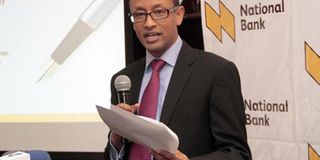National Bank of Kenya chief says his work is above board

National Bank of Kenya Chief Executive Officer Munir Ahmed at a breakfast meeting in Nairobi on June 15, 2015. FILE PHOTO | DIANA NGILA |
What you need to know:
- Ahmed lists reforms undertaken during his term.
National Bank of Kenya Chief Executive Officer Munir Ahmed has defended his term at the helm of the financial institution citing tremendous growth during the period.
While responding to questions by the Sunday Nation on the happenings at the bank, Mr Ahmed blamed people who were against his “strategic transformation of the bank” as responsible for “baseless negative stories”.
He said that NBK had a robust governance structure, risk controls, is fully regulated by Central Bank and has strong independent auditors who report directly to the board.
“We are on our way to making NBK great again through a focused strategy that includes driving 50 projects while at the same time growing the business. As a result in the last two years the bank’s operating profits grew at 45 per cent (from Sh1.15bn in 2012 to Sh2.43bn in 2014) and the balance sheet increased by 35pc (from a mere Sh67bn in 2012 to Sh123 billion in 2014). And in Quarter One 2015 our TP grew 20 per cent year on year,” said Mr Ahmed in an email.
However, Mr Ahmed conceded that they were auctioning some of the bank’s properties and some staff had left. He said that the bank does not need real assets when they can lease them.
“Yes we are selling the few branches that we own (12 per cent of the total branches). All the rest we don’t own. There is no reason for a well-run bank to own buildings because we are in the business of owning financial assets and not real assets. And a bank can generate more income from financial assets rather than the low earning buildings,” stated Mr Ahmed.
FINANCIAL ASSETS
Apart from the bank preferring financial assets to real assets, he said the bank needed to raise the 2.5 per cent capital requirement by CBK. He argued that NBK rights issue approved by shareholders in 2013 had been delayed, necessitating the property sale.
“We need capital to support the growth of the bank. The CBK increased the regulatory capital by 2.5pc in January 2015, and we also need to continue growing the assets and deposits of the bank as we await the Rights Issue approval. Therefore, we have decided to shore up the capital as an interim measure. These interim measures include the 100 per cent retention of the 2014 profits which we have done, and the sale of non-strategic sub-optimal assets/buildings,” said Mr Ahmed.
He disputed claims that the bank had problems with its licence for 2015. He said its’ renewal was “delayed” at Central Bank almost overlapping into the second quarter.
“The bank has not operated without a licence at any time. That is not allowed by the regulator. Your source doesn’t know that annual renewals which can take the whole of quarter one is not the same as banking licence,” said Mr Ahmed.
He said staff had left the company because “the structure of NBK management has been reoriented to be the finest and benchmarked against the most effective”.
“This has been implemented as part of the McKinsey developed transformation programme. It is not top heavy and for the first time NBK has the optimal front-line to back-office ratio and leaner management layer. Our salaries are in the same range as similar commercial banks and it is not among the high ones in the country,” he said.
Mr Ahmed defended the Amanah segment at NBK which he said runs on the same standards as conventional banking.




